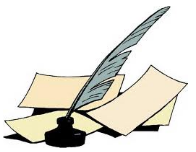If you want to make even the most seasoned writer tremble whisper the words “query letter” in his ear. The dreaded query letter is the inescapable bane of every writer’s existence—at least every writer that is looking for an agent. There are blogs with ominous names like Query Shark whose sole purpose is to help writers navigate these dangerous waters. Not only is the required format rigidly precise, it is also subject to change at a moment’s notice. Author Sean M. Chandler comments that he knows several agents who won’t read a query letter if the writer’s contact information appears at the start of the query. According to some agents, it’s now supposed to appear at the end of the letter below the closing. I was also told several years ago that in a pitch or query the writer should always reveal how the story ends. Now we’re supposed to keep the agent guessing. The list of conflicting information goes on and on, but the one thing that everyone seems to agree about is that most agents don’t want to read my query letter. They will look for any excuse—a single spelling error, improperly positioned contact information, etc.—to stop reading and delete it. So the letter must be perfect.
Figuring out the format may be difficult, but the hands down most painful part of writing a query letter is condensing a book that took years to write into 300 words or less and making it sound irresistible. I’ve written nearly 100 queries for FORGING THE BLADE over the past four years. Some are painful to reread and some are pretty good, but I think I’ve just written my best query ever—with a little help from my computer.
A few weeks ago I wrote a really good query letter and read it to my kids (who are in their 20’s and 30’s). I distilled their comments and suggestions down to their practical essence, rewrote it, and read it to them again.
“Even better,” they said.
Fine. I hit save (I’m an avid saver) and filed it.
I always wait a few days to a few weeks to review my work. It gives my unconscious awhile to chew on it and lets me see it with fresh eyes and ideas. So a few days later I sat down to reread and revise it. And it was gone.
 Horrors. My beautiful query letter was lost in cyberspace.
Horrors. My beautiful query letter was lost in cyberspace.
I checked everywhere. I did key word and first sentence searches. I checked the recycle bin. Nothing. I waited a day and checked again. I even asked my husband to look. He couldn’t find it either.
So I wrote another one. I could remember some of the lost one, so it only took me about forty-five minutes. This one was even better.
The next day when I tried to pull the new letter up it was gone too. But the lost letter was there! No kidding, it was there—right where it was supposed to be.
So I rewrote the lost letter with the improvements I could remember from the second one and came up with an even better letter.

The next day both letters appeared. It’s true, I swear it’s true. I compared the two and came up with an even better letter and the realization that my computer had taught me a great editing technique for short pieces of writing. Write your first draft, wait a few days, then write it again without looking at the first draft. It will probably be a better version. Go back to the first draft and edit it without looking at the second draft. Wait a day or so then compare both drafts and revise further.
When I told this story to a friend he said, “Your computer loves you.”
I thought about that for a moment and decided he was right, it must. After all, it gets my undivided attention much more often than anyone else, even my husband.
Thank you, computer.



7 thoughts on “A Lesson from My Computer”
Children’s ages? Sage advice.
I’m counting my daughter-in-law and future daughter-in-law as well.
That’s a fabulous technique. It makes so much sense at both neural and psychic levels!
One little thing… though your own Higher Genius via your computer helped you this time, it’s usually a Really Good Idea to put copies of important files “somewhere else” so if your computer completely crashes you have them. DropBox is an easy and free service for this. (I use it.) There are a number of others that work just fine too.
You are so right. I run the office work for two businesses and store all my manuscripts on this computer. I don’t wake up in a cold sweat any more wondering what would happen if my computer crashed because everything is stored safe and sound in The Cloud, backed up every day.
But if I can’t find a lost document on my computer, could I find it in the cloud?
These are all good things to think about when we’re considering sending out our work. As writers, we should look at our work with an honest eye — a really honest eye, after we haven’t looked at it for a few weeks to a month and the excitement of finishing and revising and revising has worn off — and see whether we can truly say that our manuscript and query letter suffers from NONE of these. If that’s the case, then we could send it out. If not, then we should keep revising.
By now, I fully understand the importance of writing a good query letter. If the letter doesn’t speak loudly and clearly to the editor you send it to, it will most likely be rejected. So getting the first few lines right is critical. I went over my first query with a fine-tooth comb last weekend. I made quite a few changes that I was pleased with. However, I had a nagging feeling that the first paragraph wasn’t right. I figured it was time to have another pair of eyes read it and give me some feedback.
My computer and I would suggest that you write it again without looking at your first draft, then compare the two. You will be surprised at how much better that second draft is.
Then send it to your second pair of eyes.